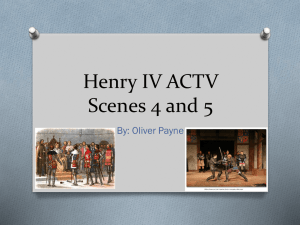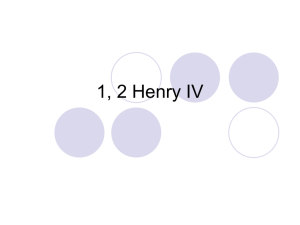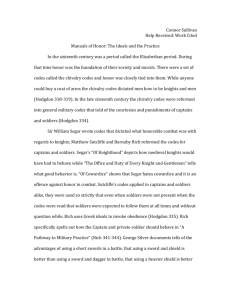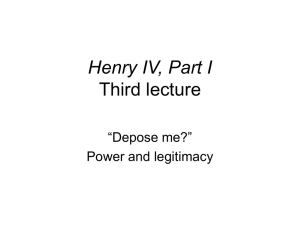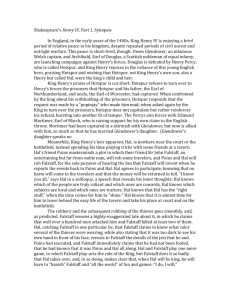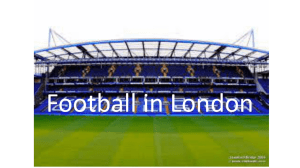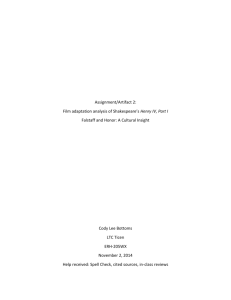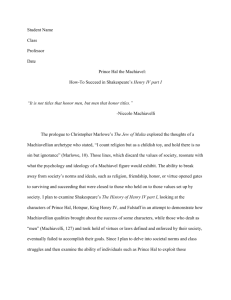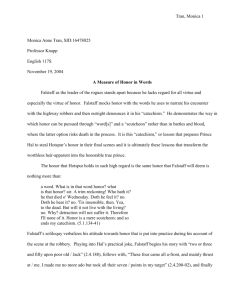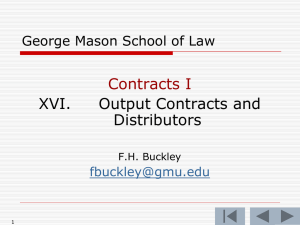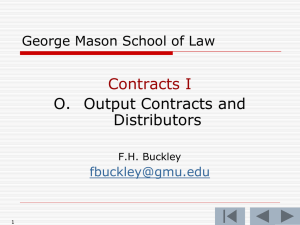Henry IV, Part 1 first lecture
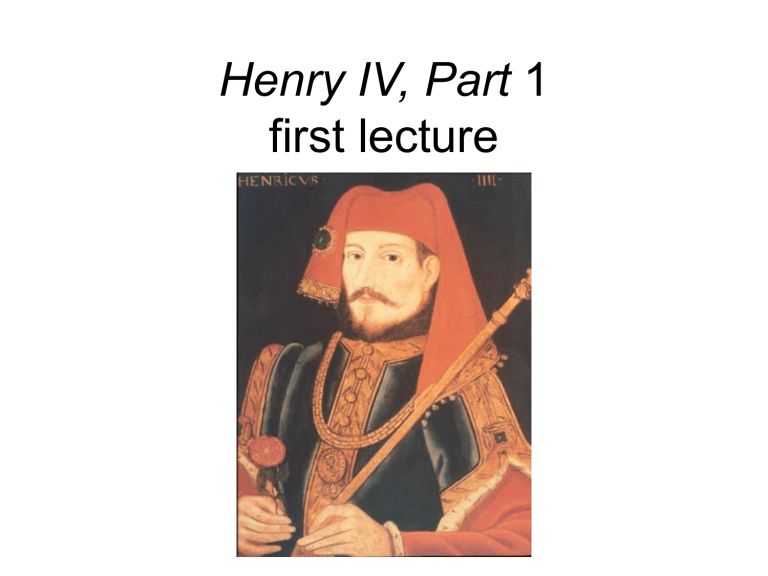
Henry IV, Part 1 first lecture
Shakespeare’s best history play?
• Multiple structures of opposition.
• Court and political world vs. tavern world.
• Hotspur vs. Falstaff.
• Prince Hal vs. Hotspur.
• King vs. Falstaff.
• Comedy vs. historical seriousness.
• Humoral oppositions.
The humors
• The four humors?
• “Sanguine”: an excess of blood; makes one cheerful, optimistic.
• “Melancholy” – an excess of black bile; makes one gloomy, pessimistic.
• “Choleric” or bilious: an excess of yellow bile in the gall bladder; makes one angry and short tempered.
• “Phlegmatic”: an excess of phlegm; makes one slow and lethargic.
• Derives originally from Hippocrates, the Greek physician and medical writer.
Humors and their associations
• And refined by Galen, Roman medical writer.
• As a medical theory it persisted into the mid 19 th century.
• Four elements?
• Air – associated with sanguine personality.
• Earth – associated with melancholy personality.
• Fire – associated with choleric personality.
• Water – associated with phlegmatic personality.
• “Dyscrasia”: the badly mixed temperament: one humor predominates.
• “Eucrasia”: the harmonious mixing of humors.
• Bodily humors understood as ascending into the brain to produce their effects.
Hotspur
• He’s the Harry Percy, Northumberland’s son, who was introduced to Bolingbroke in Richard II amid great promises of future service and loyalty.
• I, 3, 241ff: flashback to Richard II.
• In historical fact he was the same age as the king; here Shakespeare suggests he is roughly the age of Prince Hal.
• King’s envy of Northumberland over Hotspur: I,
1, 78ff.
Hotspur’s humor?
• Angered by the “certain lord, neat and trimly dressed.”
• Anger over king’s demand for Scots prisoners: I,
3, 125ff; 211ff.
• Anger over Mortimer: I, 3, 131; 219ff.
• Worcester and Hotspur: I, 3, 253ff.
• His extravagant idealizing: “By heaven, methinks it were and easy leap/ To pluck bring honor from the palefaced moon.” (I, 3, 201ff).
• His disdain for caution, careful planning: 2, 3.
“That roan shall be my throne”
• Venus vs. Mars: II, 3, 36ff.
• “A weasel hath not such a deal of spleen/
As you are tossed with.” (l. 77-78).
• “This is no world to play with mammets and tilt with lips.”
• Quarrel with Glendower: III, 1
• His aversion to verse, poetry, III, 1, 126ff.
• His restlessness: III, 1, 231ff.
Clip of BBC production of play, III,
1, 210ff.
Falstaff’s humor?
• “What a devil hast thou to do with the time of day?” 1, 2.
• Phlegmatic humor.
• His opposition to Hotspur?
• Hotspur’s restless activity
• Falstaff’s relentless inactivity .
• Hotspur’s courage and military prowess
• Falstaff’s cowardice: II, 2, 97ff.
• II, 4: 132ff.
Falstaff’s fantasy of martial courage
• “What? Fought you with them all?” (II, 4,
177)
• At least fifty of them.
• Multiplying rogues in buckram suits.
• “Art thou mad, art thou mad? Is not the truth the truth?”
• Falstaff’s “instinct”!
• “The lion will not touch the true prince.”
Falstaff and Hotspur
• Hotspur’s military prowess.
• And Falstaff’s: IV, 2, 11ff.
• “Tut, tut, good enough to toss; food for powder, food for powder. They’ll fill a pit as well as better. . . “
• Falstaff’s “pistol”: “’Tis hot, ‘tis hot. There’s that will sack a city.”
• Hotspur: “By heaven, methinks it were an easy leap/ To pluck bright honor from the pale-faced moon,/ Or dive to the bottom of the deep . . .” (I,
3, 201ff)
• Falstaff’s “catechism” of honor: V, 1, 1219.
Final stage juxtaposition of Falstaff and Hotspur
• On stage Falstaff appears dead; we need to forget what we know from stage direction:
Falstaff “who fall(s) down as if he were dead.”
• Hotspur also dies.
• Prince Hal stands between them.
• “Oh, I should have a heavy miss of thee/ If I were much in love with vanity.”
• “Falstaff riseth up” (!)
• Stabs the dead Hotspur, and picks him up.
• And claims to have killed him.
• “Why, Percy I killed myself and saw thee dead.”
• Falstaff: “Didst thou? Lord, Lord, how this world is given to lying.”
• “If I do grow great, I’ll grow less; for I’ll purge, leave sack, and live cleanly, as a nobleman should.”
• Yeh, right!
Prince Hal between Hotspur and
Falstaff
• Stage image at V, 4, may suggest his position between the humor extremes.
• But Falstaff “riseth up.”
• His use of the tavern world: “I know you all and will awhile uphold/ The unyoked humor of your idleness. . .” (I, 2, 188)
• Tavern world as foil.
• “Redeeming time.”
Hal’s reformation
• King’s characterization of the prodigal prince (III,
2): fathers and sons.
• “For all the world/ As thou art to this hour was
Richard then/ When I set foot at Ravensburgh;/
And even as I was then is Percy now.”
• Hal’s claim: “I will redeem all this on Percy’s head.”
• “And I will die a hundred thousand deaths/ Ere I break the smallest parcel of this vow.”
